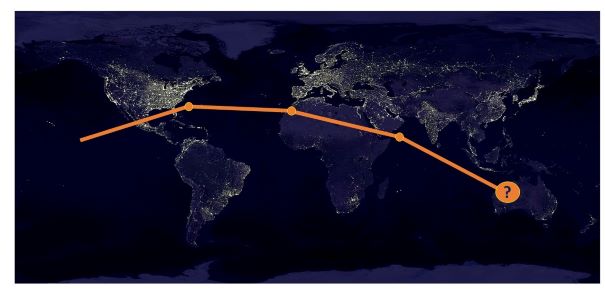According to Armada Corporate Intelligence Purchaser’s Managers Indexes Believe the World is in Recession.
Taking just the manufacturing PMI’s from around the world into account, one would think that the world has already slipped into recession. Fifteen of the PMI’s around the world are already in contraction, six more are under 51 and just barely above the midpoint of 50, and all but the secondary Asian markets (which are currently filling in for China) are showing monthly contraction.
 The chart at right shows the PMI’s from October, now that all have reported. Looking at the month-over-month change in the PMI’s; we can easily see the contraction taking place sequentially. Of those economies that were not slipping month-over-month, only India and Singapore were not in contraction (a reading below 50). All others that had monthly improvements in their PMI activity were in contraction, and the improvements were slight and based on improving output (being able to fulfill backlogged orders).
The chart at right shows the PMI’s from October, now that all have reported. Looking at the month-over-month change in the PMI’s; we can easily see the contraction taking place sequentially. Of those economies that were not slipping month-over-month, only India and Singapore were not in contraction (a reading below 50). All others that had monthly improvements in their PMI activity were in contraction, and the improvements were slight and based on improving output (being able to fulfill backlogged orders).
The big concern is that new orders are generally down around the world. Most manufacturing surveys showed that companies were increasing output to fulfill backorders, but their backlogs are easing, supply chains are getting back in cycle, and unfortunately the new order demand just isn’t there.
The implication is that 1) global demand is indeed slowing and 2) that will be felt in the coming months as the November and December PMI’s are reported.
Raw material prices are also still decelerating, amid falling inventories for many products as we have reported many times (global inventories of aluminum, nickel, zinc, etc.). That relationship wouldn’t work that way (typically lower supplies lead to higher prices) unless demand was falling quickly.
China and much of Europe have been slow to reorder raw materials because of energy shortages and the prospect that they will have to shut down industrial production to save energy during the colder winter months. China might be rebuilding inventories at a national level (beginning to stockpile while prices are lower), but individual manufacturers are not stockpiling any further at this time.
Although this is not the only factor that signals recession, it is one of the key factors in many developing nations, more so than in the US where the services sector carries a heavier percentage of total GDP.
Supply Chain Issues: Reshoring or ‘Friend Shoring’
Reshoring is a real thing with over a trillion dollars spent this year to bring production back to the US. There is also more emphasis on “friend shoring” as supply chain managers seek relationships with countries that are more ally than rival. This is a real trend but the US continues to buy billions from China (over $550 billion in 2021). The trade deficit worsened in the last few quarters as the strong dollar made imported items ever more appealing. There are over 500 categories of imports from China. China does not buy as much from the US but what it buys is critical. The country is only 20% independent when it comes to soybeans and the bulk of that 80% deficit is addressed by buying from the US. These are intertwined economies and these relationships will not vanish overnight.
There will be two dominant factors regarding the status of trade relations with China. The first is political. The US will seek to restrict trade in areas deemed to be critical to national security in some way. We have already seen restrictions on chip technology and a wide variety of similar industrial sectors that could be exploited by China. This is a very slippery concept however and often reflects the lobbying clout of an industry more than military sensitivity. There have been restrictions on imports and exports that seem to be very distant from security issues. China is also restricting imports as they seek more and more economic and trade independence. In the just completed 20th Party Congress meeting there was emphasis on producing domestically and reducing China’s reliance on imports and even a deemphasis on exports as Xi wants more domestic consumption.
US interests: The US watched globalization offer deep discounts to consumers through these imported goods, but also watched 20 million manufacturing jobs vanish as companies outsourced production.
Source: Armada Corporate Intelligence


























